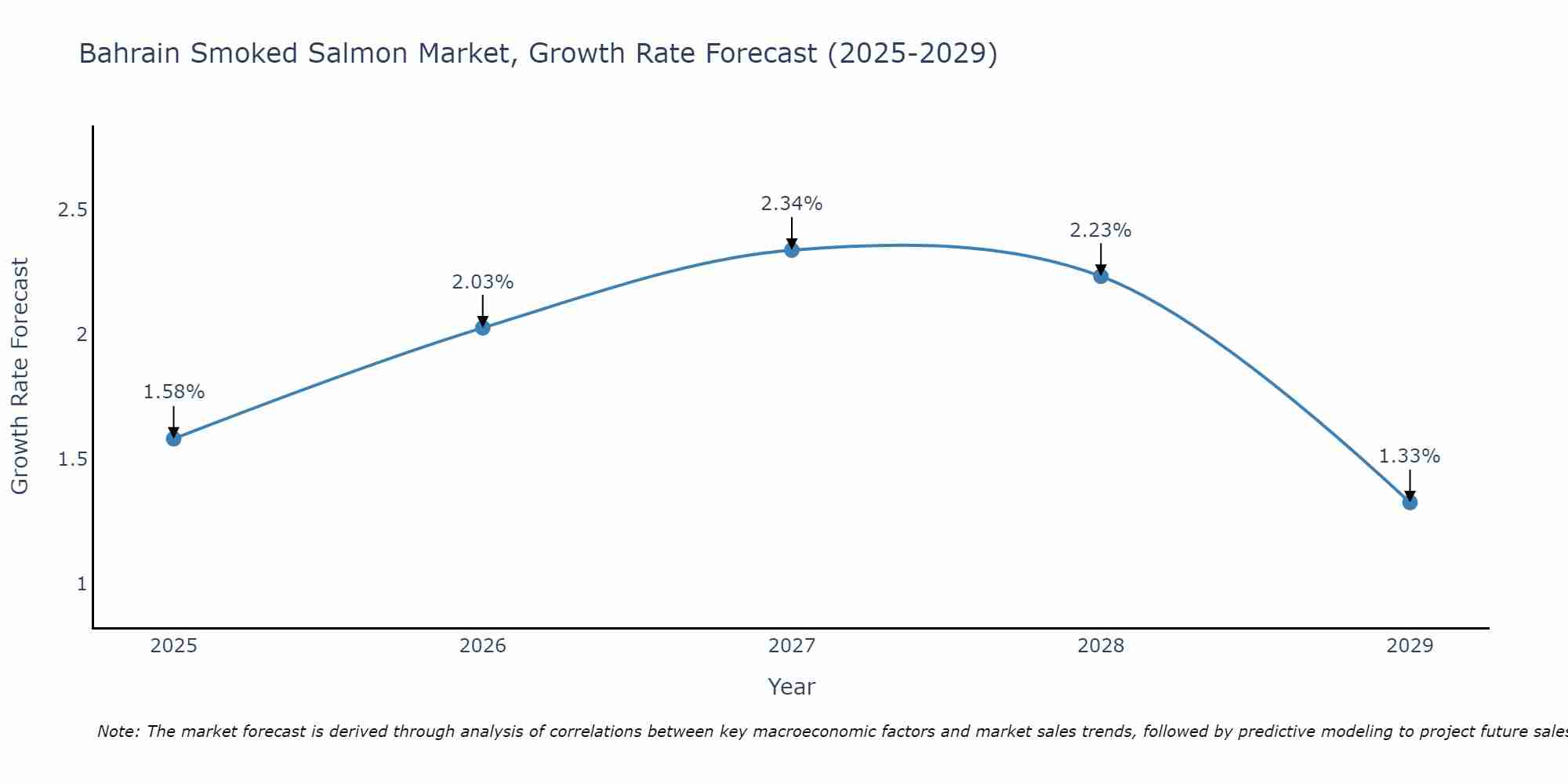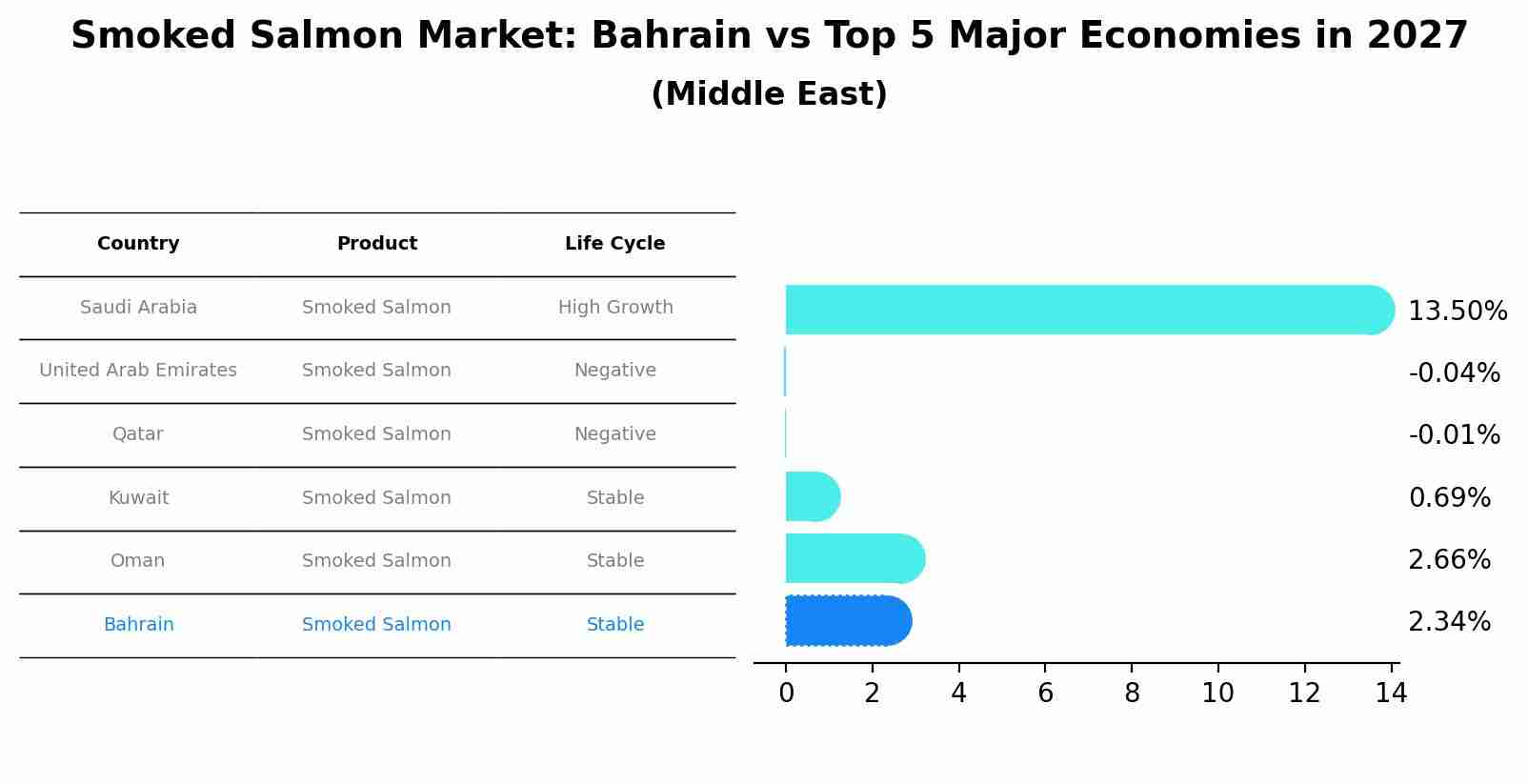Bahrain Smoked Salmon Market (2025-2031) Outlook | Revenue, Trends, Industry, Analysis, Growth, Companies, Share, Size, Value & Forecast
| Product Code: ETC387884 | Publication Date: Aug 2022 | Updated Date: Apr 2025 | Product Type: Market Research Report | |
| Publisher: 6Wresearch | Author: Bhawna Singh | No. of Pages: 75 | No. of Figures: 35 | No. of Tables: 20 |
Bahrain Smoked Salmon Market Size Growth Rate
The Bahrain Smoked Salmon Market is projected to witness mixed growth rate patterns during 2025 to 2029. Starting at 1.58% in 2025, the market peaks at 2.34% in 2027, and settles at 1.33% by 2029.

Smoked Salmon Market: Bahrain vs Top 5 Major Economies in 2027 (Middle East)
Bahrain's Smoked Salmon market is anticipated to experience a stable growth rate of 2.34% by 2027, reflecting trends observed in the largest economy Saudi Arabia, followed by United Arab Emirates, Qatar, Kuwait and Oman.

Bahrain Smoked Salmon Market Synopsis
Smoked salmon is a high-end product in Bahrain, featured prominently in brunches, hotel menus, and gourmet retail. It is almost entirely imported, with variations such as cold-smoked, hot-smoked, and flavored options. The market appeals to affluent consumers and health-focused individuals seeking premium protein. As Western culinary influence grows, so does the popularity of smoked salmon.
Trends of the market
Smoked salmon is becoming increasingly popular in Bahrains gourmet and health-conscious consumer segments. Imported primarily from Europe and North America, it is commonly found in upscale supermarkets, hotel buffets, and fine dining establishments. The demand is driven by a growing appreciation for Western cuisine and the products high protein, omega-3 profile. Despite its premium pricing, smoked salmon is carving a niche due to evolving tastes and lifestyle trends. Future growth may come from wider retail availability and locally packaged imported cuts.
Challenges of the market
The smoked salmon market in Bahrain remains niche due to cultural preferences for freshly prepared or traditionally seasoned fish. Smoked products often rely on imports, which elevates prices and limits availability. Cold chain logistics are essential but costly, leading to concerns about freshness and quality upon arrival. Consumer awareness around smoked salmons culinary uses is still developing, which restricts demand to high-end retail and hospitality sectors. Regulatory hurdles related to food safety and preservatives further complicate the supply chain. These issues combine to keep the market limited in scope and accessibility.
Investment opportunities in the Market
The smoked salmon market in Bahrain is expanding within premium retail, hospitality, and gourmet segments. As consumer tastes shift toward Western and fusion cuisines, demand for smoked salmon continues to grow among health-conscious and affluent buyers. Investors can consider importing high-quality smoked salmon, developing regional smoking operations, or launching branded retail products such as pre-sliced packs or salmon spreads. Strong logistics and refrigeration systems will be crucial for quality control. Collaborations with restaurants and supermarkets can further amplify market presence, making smoked salmon a high-margin niche investment.
Government Policy of the market
The smoked salmon market in Bahrain is governed by stringent import regulations, as the country does not produce salmon domestically. Import policies enforced by the Bahrain Food and Drug Authority (BFDA) require all smoked salmon products to meet the highest food safety standards, including cold chain requirements and halal certification. These policies are designed to protect public health and maintain the quality of seafood consumed within Bahrain. Furthermore, the government encourages the use of sustainable sourcing for smoked salmon imports, with specific requirements for traceability and origin labeling. Bahrains position as a regional trade hub facilitates the importation of premium products, including smoked salmon from major global producers. However, there is growing interest in developing domestic seafood processing capabilities to add value to imported raw fish, with incentives for processing plant investments and export-oriented initiatives.
Key Highlights of the Report:
- Bahrain Smoked Salmon Market Outlook
- Market Size of Bahrain Smoked Salmon Market, 2024
- Forecast of Bahrain Smoked Salmon Market, 2031
- Historical Data and Forecast of Bahrain Smoked Salmon Revenues & Volume for the Period 2021 - 2031
- Bahrain Smoked Salmon Market Trend Evolution
- Bahrain Smoked Salmon Market Drivers and Challenges
- Bahrain Smoked Salmon Price Trends
- Bahrain Smoked Salmon Porter's Five Forces
- Bahrain Smoked Salmon Industry Life Cycle
- Historical Data and Forecast of Bahrain Smoked Salmon Market Revenues & Volume By Type for the Period 2021 - 2031
- Historical Data and Forecast of Bahrain Smoked Salmon Market Revenues & Volume By Vac/Vacuum Packing for the Period 2021 - 2031
- Historical Data and Forecast of Bahrain Smoked Salmon Market Revenues & Volume By Vac/Vacuum Packing Covered With Cardboard Envelope for the Period 2021 - 2031
- Historical Data and Forecast of Bahrain Smoked Salmon Market Revenues & Volume By Canned Packaging for the Period 2021 - 2031
- Historical Data and Forecast of Bahrain Smoked Salmon Market Revenues & Volume By Application for the Period 2021 - 2031
- Historical Data and Forecast of Bahrain Smoked Salmon Market Revenues & Volume By Food Service Sector for the Period 2021 - 2031
- Historical Data and Forecast of Bahrain Smoked Salmon Market Revenues & Volume By Retail Sector for the Period 2021 - 2031
- Bahrain Smoked Salmon Import Export Trade Statistics
- Market Opportunity Assessment By Type
- Market Opportunity Assessment By Application
- Bahrain Smoked Salmon Top Companies Market Share
- Bahrain Smoked Salmon Competitive Benchmarking By Technical and Operational Parameters
- Bahrain Smoked Salmon Company Profiles
- Bahrain Smoked Salmon Key Strategic Recommendations
Frequently Asked Questions About the Market Study (FAQs):
- Single User License$ 1,995
- Department License$ 2,400
- Site License$ 3,120
- Global License$ 3,795
Search
Thought Leadership and Analyst Meet
Our Clients
Related Reports
- Afghanistan Apparel Market (2026-2032) | Growth, Outlook, Industry, Segmentation, Forecast, Size, Companies, Trends, Value, Share, Analysis & Revenue
- Canada Oil and Gas Market (2026-2032) | Share, Segmentation, Value, Industry, Trends, Forecast, Analysis, Size & Revenue, Growth, Competitive Landscape, Outlook, Companies
- Germany Breakfast Food Market (2026-2032) | Industry, Share, Growth, Size, Companies, Value, Analysis, Revenue, Trends, Forecast & Outlook
- Australia Briquette Market (2025-2031) | Growth, Size, Revenue, Forecast, Analysis, Trends, Value, Share, Industry & Companies
- Vietnam System Integrator Market (2025-2031) | Size, Companies, Analysis, Industry, Value, Forecast, Growth, Trends, Revenue & Share
- ASEAN and Thailand Brain Health Supplements Market (2025-2031) | Strategy, Consumer Insights, Analysis, Investment Trends, Opportunities, Growth, Size, Share, Industry, Revenue, Segments, Value, Segmentation, Supply, Forecast, Restraints, Outlook, Competition, Drivers, Trends, Demand, Pricing Analysis, Competitive, Strategic Insights, Companies, Challenges
- ASEAN Bearings Market (2025-2031) | Strategy, Consumer Insights, Analysis, Investment Trends, Opportunities, Growth, Size, Share, Industry, Revenue, Segments, Value, Segmentation, Supply, Forecast, Restraints, Outlook, Competition, Drivers, Trends, Demand, Pricing Analysis, Competitive, Strategic Insights, Companies, Challenges
- Europe Flooring Market (2025-2031) | Outlook, Share, Industry, Trends, Forecast, Companies, Revenue, Size, Analysis, Growth & Value
- Saudi Arabia Manlift Market (2025-2031) | Outlook, Size, Growth, Trends, Companies, Industry, Revenue, Value, Share, Forecast & Analysis
- Uganda Excavator, Crane, and Wheel Loaders Market (2025-2031) | Strategy, Consumer Insights, Analysis, Investment Trends, Opportunities, Growth, Size, Share, Industry, Revenue, Segments, Value, Segmentation, Supply, Forecast, Restraints, Outlook, Competition, Drivers, Trends, Demand, Pricing Analysis, Competitive, Strategic Insights, Companies, Challenges
Industry Events and Analyst Meet
Whitepaper
- Middle East & Africa Commercial Security Market Click here to view more.
- Middle East & Africa Fire Safety Systems & Equipment Market Click here to view more.
- GCC Drone Market Click here to view more.
- Middle East Lighting Fixture Market Click here to view more.
- GCC Physical & Perimeter Security Market Click here to view more.
6WResearch In News
- Doha a strategic location for EV manufacturing hub: IPA Qatar
- Demand for luxury TVs surging in the GCC, says Samsung
- Empowering Growth: The Thriving Journey of Bangladesh’s Cable Industry
- Demand for luxury TVs surging in the GCC, says Samsung
- Video call with a traditional healer? Once unthinkable, it’s now common in South Africa
- Intelligent Buildings To Smooth GCC’s Path To Net Zero


















